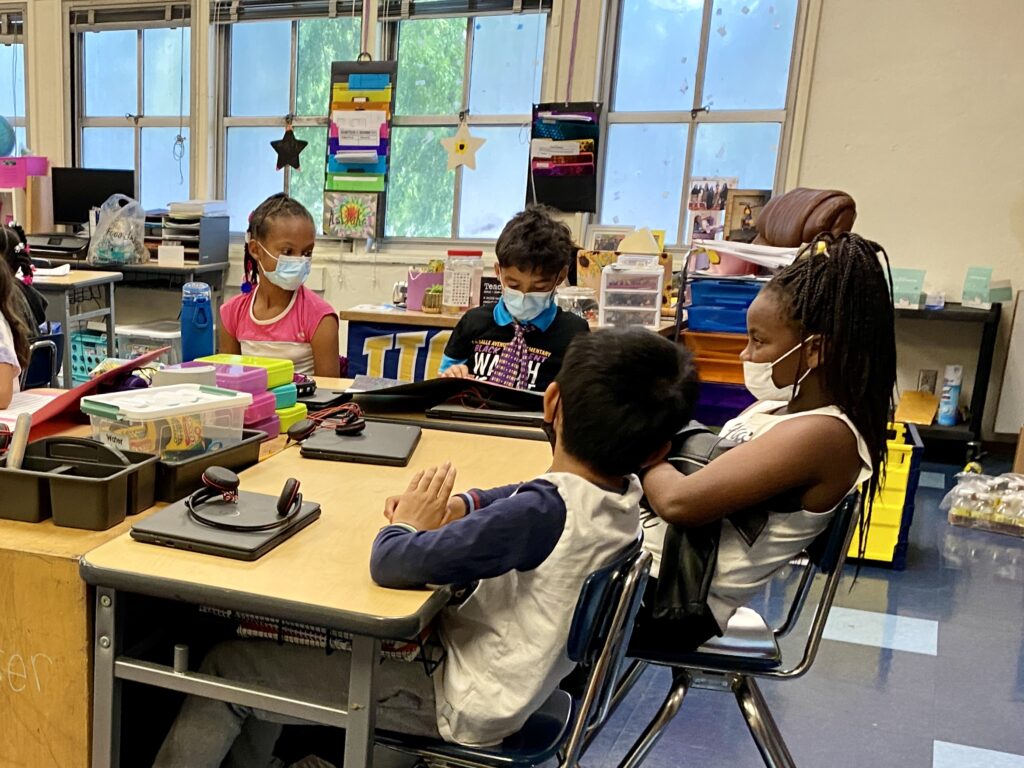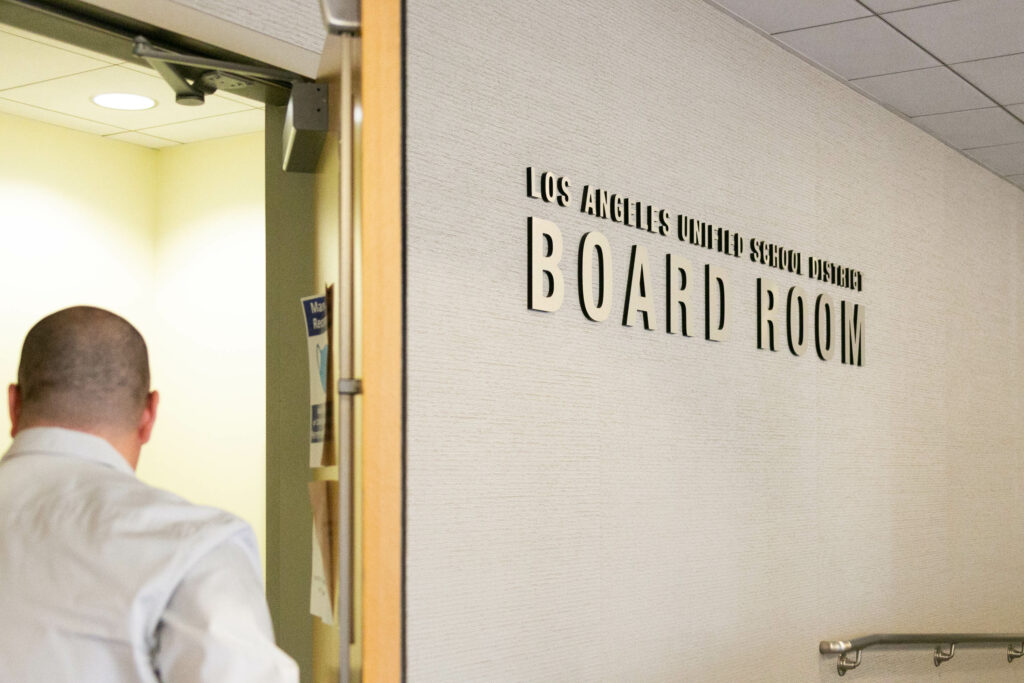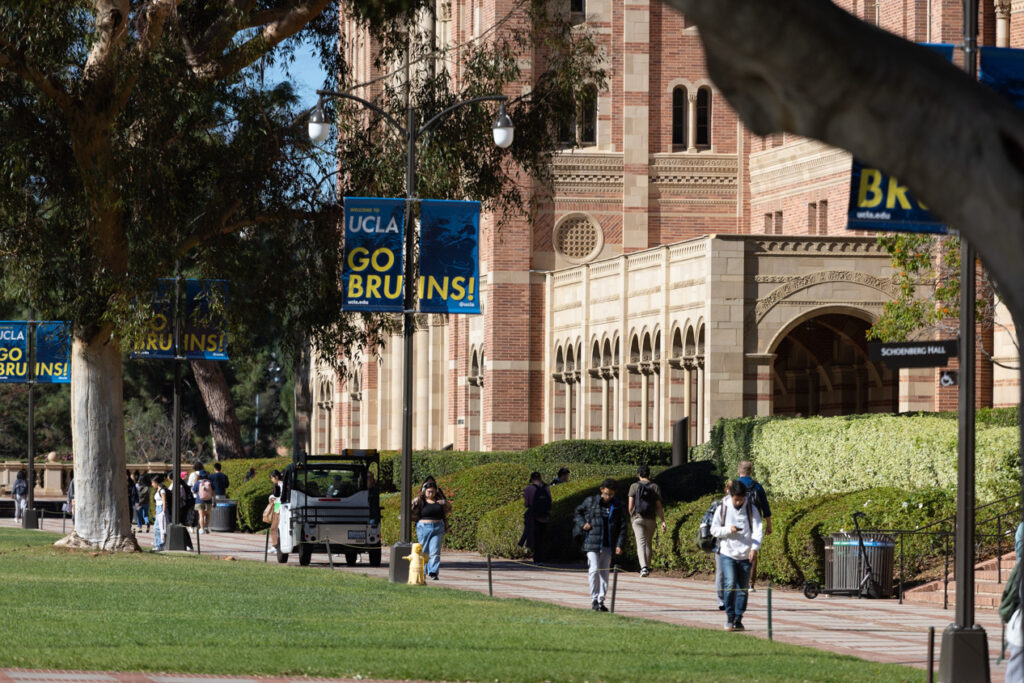
Students at La Salle Avenue Elementary listen to a class presentation. The school is one of 53 schools in the first tier of the Black Student Achievement Plan.
KATE SEQUEIRA/EDSOURCE
The Los Angeles Unified School District is considering broadening the language associated with the Black Student Achievement Plan in an attempt to avoid investigation by the U.S. Department of Education, a move supporters fear could steer the focus of the program away from Black student achievement and wellness.
The potential change in the Black Student Achievement Plan comes after Parents Defending Education, a conservative group with a track record of challenging schools’ efforts to promote equity, filed a complaint with the U.S. Department of Education in July, claiming the program violated the Civil Rights Act of 1964 and the equal protection clause of the 14th Amendment because it specifically supports Black students.
“We are just starting to see the positive impact of BSAP, creating a positive and welcoming learning environment and greater access to culturally and racially responsive coursework and field trips due to dedicated BSAP staff members and community partners,” said school board member Tanya Ortiz Franklin in a statement to EdSource.
“With continued investments and support — not diluted or threatened programming —I look forward to seeing our Black students achieve in the ways that we all know is possible.”
While program supporters say the complaint by Parents Defending Education is largely unsubstantiated, they fear any efforts to alter it in response could have consequences for students in Los Angeles and beyond.
An LAUSD spokesperson said in an email to EdSource that the mission and operations of the program will not change and that “the district is ensuring that the associated language aligns with the law and practice by clarifying that BSAP operates in accordance with the District’s Nondiscrimination policy, based on applicable federal and state laws.”
The Education Department has already warned districts to avoid programs that focus on one student group. In August, a month after Parents Defending Education filed the complaint, the department released a guidance letter to school districts in response to an uptick in complaints.
“Schools may violate Title VI when they separate students based on race or treat individual students or groups of students differently based on race,” the guidance reads. “Schools also may violate Title VI when they create, encourage, accept, tolerate, or fail to correct a racially hostile educational environment.”
The letter also adds that “a school-sponsored or recognized group or program with a special emphasis on race, such as a student club or mentorship opportunity, that is open to all students, typically would not violate Title VI simply because of its race-related theme.”
The complaint
The complaint lodged by Parents Defending Education claims LAUSD’s Black Student Achievement Plan discriminates against students of other races. EdSource reached out to Parents Defending Education requesting an interview but did not receive a response.
The program “directly responds to the unique needs of Black students but not students of other races,” the complaint alleges.
“The District makes clear that the program is designed ‘to address the longstanding disparities in educational outcomes between Black students and their non-Black peers.’… And the District notes that the program is meant to address ‘[t]he perennial trend of black student underperformance; and to achieve ‘racial equity.’”
The complaint against LAUSD includes two pieces of documentation: screenshots of the district’s Black Student Achievement Plan website as well as an overview of the program.
But supporters of the district’s plan say the complaint lacks teeth — especially as it does not include a claim that anyone suffered or was discriminated against because of the program.
Amir Whitaker of the ACLU of Southern California’s Senior Policy Counsel said he doubts the U.S. Department of Education will choose to investigate the district.
Parents Defending Education’s goal, he said was about creating “hysteria about the complaint.”
Parents Defending Education, which describes itself as a “national grassroots organization working to reclaim our schools from activists promoting harmful agendas,” has levied complaints against educational agencies throughout the country, including in Pennsylvania, Maine, Vermont and Oregon.
“I think a lot of other districts and states are really reluctant to kind of engage in something that’s very race specific because of the ways in which we as a country …are not comfortable with having race conversations, despite the disproportion of Black students who are in special education … the number of Black students who are suspended, the high rates of Black students who are chronically absent,” said Tyrone Howard, a professor of education at UCLA.
“So I wish we had just as much energy and anger around those data as we do around the fact that we think that (a law) might be violated.”
Program’s impact
The Los Angeles Unified School District board approved the Black Student Achievement Plan in February 2021 after widespread community calls to action and in the wake of George Floyd’s murder and the racial reckoning that followed.
The Black Student Achievement Plan cut the district police budget by more than 30% and vowed to uplift Black student achievement, create “culturally responsive curriculum” and fund a team of counselors, climate advocates and psychiatric social workers at 53 top-priority schools that collectively educate a third of LAUSD’s Black student population.
“The ultimate beauty is that commitment to BSAP will … not only serve the Black students that have been disproportionately underserved for far too long. It has lots of implications on the district just improving as a whole,” said Christian Flagg, the director of training at Community Coalition, a foundation that aims to “upend systemic racism” and played a key role in the plan’s establishment.
In 2011, a decade before the plan was established, the U.S. Department of Education’s Office for Civil Rights — which also received the Parents Defending Education complaint — conducted an investigation into LAUSD.
The investigation found discrepancies in the treatment and experience of Black students in comparison to their peers, including the percentage of students admitted to the Gifted and Talented Education program, availability of technological resources, newness of textbooks, prevalence of teacher absenteeism and rates of discipline.
In response to the investigation, LAUSD offered to enter an agreement to resolve the concerns.
A survey of 2,300 students across 100 LAUSD campuses found that since the Black Student Achievement Plan rolled out, 87% of Black students had benefited from the program. Still, nearly half the students also said their schools do not have enough resources for Black students.
Lindsey Weatherspoon, a senior at Venice High School who said she has benefited from the Black Student Achievement Plan, credits her campus BSAP counselor for helping her and her peers attend events at which some Historically Black Colleges and Universities made on-the-spot admissions offers to seniors.
Weatherspoon said she strongly hopes LAUSD will “stand strong in their decision to have BSAP and fund BSAP, and it’s not a situation where BSAP gets cut back.”
“I hope, in fact, it gets expanded continuously to more schools, and the program constantly evolves because BSAP is not just something that happened overnight. It’s been years in the making. And it’s been the labor of love of several groups and community members and students and teachers pushing to get this program made.”
The BSAP counselor, she said, gives students more personalized counseling and creates opportunities for Black students to spend time together, which is essential because “it’s really easy to feel disconnected from other Black students when you barely see any.”
Weatherspoon said, “The thought that it could … be degraded from its original purpose or its original use is just mind-blowing and heartbreaking.”
Moving forward
The Black Student Achievement Plan being compromised, either as a result of board action or the complaint itself, could lead to greater consequences for both the district and for the nation, the program’s supporters say.
Channing Martinez, co-director of the Labor/Community Strategy Center, said that the program is “not saying that Latinx students or white students or other students don’t deserve equal access to opportunity, but it is saying that Black students have not had equal access.”
He added that while the district may be concerned about Parents Defending Education’s complaint, LAUSD could also face lawsuits or complaints from organizations supporting the program if they dilute the program.
“In 2020, you had George Floyd, and it was pretty easy in the board’s mind to defund the school police as a measure of saying that they’re going to stand with Black students, but this year we don’t have George Floyd. But that doesn’t mean that the lives of Black students don’t matter,” Martinez said.
“It does really put us in a really tight spot in which we want to believe in the Black Student Achievement Program. But at the same time, it almost feels as if we are stuck in this program, and that they are using this program to say ‘Look, we’re doing something for Black students.’”
Earlier this year, Gov. Gavin Newsom proposed an “equity multiplier” that would grant $300 million in ongoing funding to the state’s poorest students in an effort to uplift Black student achievement. But some critics of the proposal said it would not do enough to specifically support Black students.
Howard, the UCLA education professor, described the nature of the complaint by Parents Defending Education as racist because there has been little opposition to other programs designed to support different groups of students who are more vulnerable, including students with disabilities and those struggling with homelessness.
Programs like the Black Student Achievement Plan are hard to come by, Howard said. And if the complaint succeeds, he is concerned it could deter other schools throughout the state and nation from developing similar programs.
“Essentially, it says we’re fine with Black failure. We’re fine with Black underperformance. We’re fine with Black students consistently not experiencing schools in a way that their peers do,” Howard said. “That’s to me the bigger takeaway message. And why do we feel so comfortable with that?”




